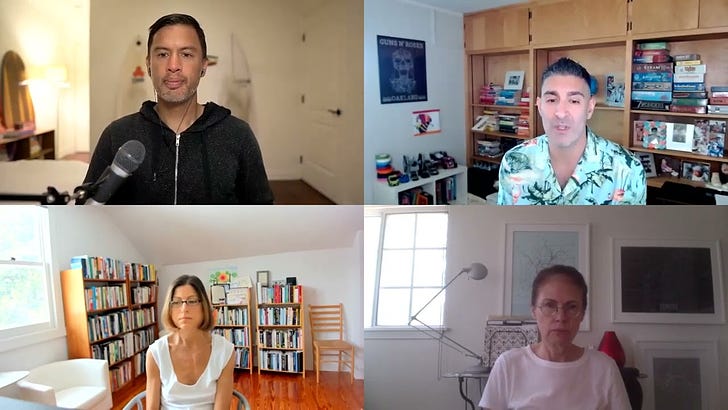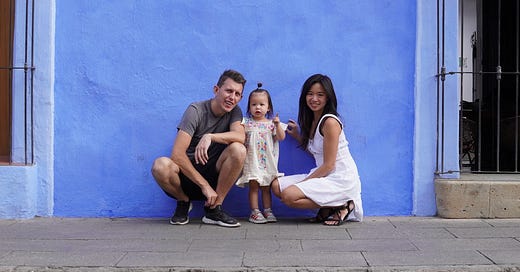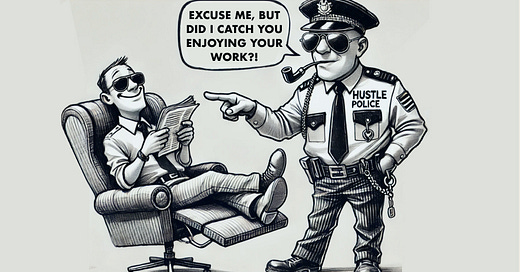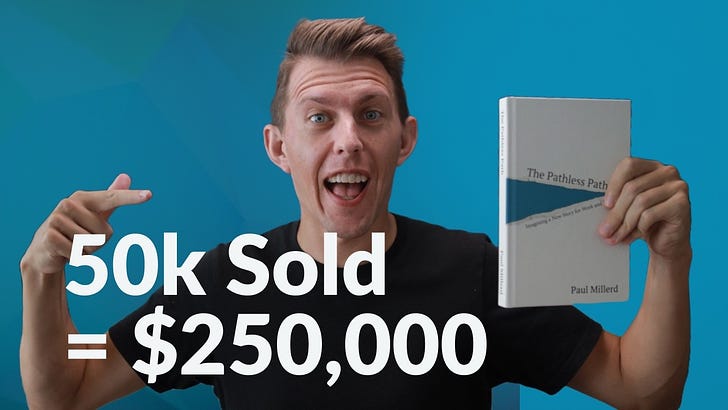Hey Boundless readers! I’m off on paternity leave for March and am handing over the reins to some trusted friends. Today’s guest issue is hosted by Kris Abdelmessih who has been writing the amazing newsletter for a couple of years and manages to shift smoothly between philosophical musings on the good life and parenting and in-depth breakdowns into quantitative finance, probability theory, and math. If you like getting nerdy (but not too much) you should give him a follow.
On to Kris…
Greetings Boundless readers,
First, Paul and Angie — this feels underpowered, but umm f’n CONGRATS!
There’s nothing in life that prepares you for your baby’s voice when that first wail pierces the chaos of a delivery room. The volume knob on every other sound in the room is turned to zero.
There’s going to be diapers and swaddling lessons and milk anxiety and routine and all that. We adapt to a new norm. But you’re never the same. When that first child is born, you are reborn. It’s all new again. Paul and Angie, bask in it. No need to read the rest, go love Michelle, I got it from here…
Hi all. I’m Kris. A friend of Paul’s.
I’m a 44-year-old dude. Husband, dad. A grown-up and a kid at the same time. To my joy and detriment alike.
My conventional path has been a professional trader. I spent a decade hootin’ and hollerin’ on every options exchange in NYC. I spent the next decade in the Bay Area building a commodity trading business for an options fund in SF. I started writing on the internet 4 years ago, I left the daily grind 2 years ago to focus on writing.
My boys are almost 7 and 10 and I’m cognizant that these are magical years I want to be present for but it’s not without tension — I like being immersed in work to the point of imbalance. But priorities compete. That’s ok. If you work on things you believe in, enjoy, and are good at then you will create value for others. No need to apologize for wanting to grind. And there’s no need to apologize for not wanting to grind. Just like you want to eat with the seasons, and sleep when the sun goes down, it’s ok to view your life’s seasons the same way. My wife likes to say — “you CAN have it all…just not at once.” This is handy to keep in mind if you believe happiness is the spread between reality and expectations.
Today, I’m living a portfolio life that includes advising, teaching, gaming, fundraising, investing, and community initiatives. A pathless path of my own. Following curiosity sustainably. Having a steady paycheck but feeling the pull of other work is like having a technical problem solved, namely making ends meet, but having an existential problem. I basically swapped problems implicitly betting that I’ll solve the technical problem of making money.
In an integrated life, work is one of many channels of self-expression. The first step to alienation is to deny the importance of this. I used to tell myself stories about why I write online…many of those stories you’ve heard all over the internet especially if you travel in adjacent circles to Paul:
“I write to think better”
“I write to teach”
“I write to build a public 21st-century CV”
I just listened to Bill Gurley on Tim Ferriss and he mentioned that some people feel compelled to write (he used Prof Michael Mauboussin as an example) because they are compulsive learners and writing is a powerful forcing mechanism to learn.
This is all true.
But Paul phrased it in a beautiful way. He told me, “Kris, you write to find the others.” As soon as he said it I knew it was the most complete answer.
I’m filtering for people I want on the damn liferaft. That’s the subconscious selfish reason. But I have another reason that I like to think is generous but might easily be cast as narcissistic (after all, who the hell am I to pontificate outside my narrow expertise) — I believe the greatest thing I could do with my writing is give others permission to embrace their multitudes. That’s why I write so personally (perhaps TMI sometimes). It’s an attempt to show not tell.
Identities and culture create cohesion and a sense of peace. But they can also trap you in a pen. If identity is not serving you, you must remember how arbitrary and path-dependent it is. Where and when you are born. To whom. The random job you took that set dominoes in motion. Many of the things you may think of yourself are not deliberate. They’re downstream of historical accidents.
I find this thought liberating. It’s permission to go “off script” as Paul likes to say.
#1 // A love letter to Paul
As regular readers of Paul, I think you will agree that despite his, I don’t know, aggressive ambivalence towards hustle culture, Paul's message and outlook are far more ambitious than the traditional scripts we’re used to because they bring your entire self into the accounting.
Traditional ambition pretends that there is a transparent exchange rate between money and time or money and joy. That you can collapse our values into USD like a spreadsheet rollup formula. Consider the logic of tort law — we put dollar values on suffering. How about carbon offsets — where someone can rinse their sins by paying extra.
Time = money
Taking a private jet because your time is worth so much = pollution
Add a surcharge to compensate for pollution
Maybe this is ok. Pricing tort damages and carbon are adjustments made out of practical necessity. They are convenient compromises to complex collective action problems. I’m no scholar on these issues so moaning about them narrowly is probably unfair to the complicated discourse which landed us at the status quo. I feel more comfortable saying we shouldn’t overplay the logic of those hands when it comes to thinking about our lives. How much are you willing to sell “chasing your own potential” for short-term comfort? Everyone with a steady job distracted by a dream faces this question.
Paul’s magic is that instead of saying “hey you know all that left-brain thinking that many of you use to be successful in your careers — yea just ignore all that when it comes to your life”, Paul brings those hard-to-price elements to the surface so you can make more fair comparisons. He shows you the options that you are undervaluing when you think about happiness holistically. He shows you how to put the right price on fear — if a rich reader were asked to bet on the odds of their going broke they’d probably handicap it appropriately at a pretty low probability, yet many still live with a scarcity mindset.
This is a disconnect between belief and action.
Paul’s work and suggestions build a bridge between them. Not with hand-waving toxic positivity but with the same rigor that you bring to more legible problems you’ve encountered all your life. Your emotions and thoughts can now talk to each other. Not by colonization — by forcing one side to learn the other’s language but by meeting in the middle. By acknowledging that neither side is complete.
Thank you Paul for doing you.
If you haven’t read Pathless Path you should. If you have and want it to wash over you again, these are the parts that vibrated for me:
#2 // Self-Experimentation
Earlier this year I wrote a short post called Spending As Self-Discovery. It is infused with Paul’s “you need to experiment to discover yourself” ethos. I shall return its spirit to its master by reprinting it here in Boundless:
Regarding my career
It’s become more of a priority to sustain a living in a way that feels deeply tied to others. There are a lot of ways to make money, but finding a way that doesn’t feel alienating, finding a way that feels like I’m lifting others is harder to pull off. To be clear, any constraint limits your options. Expectancy-wise I’m paying for this preference the same way a remote worker might be taking a pay cut compared to the counterfactual. But this is only a concern if I measure expectancy only in dollars. That’s falling into a trap of letting legible accounting dictate all of what matters. You know what’s more baller — giving your soul a bank account and finding a way to stack it. That means more energy for everyone else around you.
Look, if you have the luxury of reading a Substack at your desk, then simply making money is easy. You just have to be good at something. By definition, mediocrity is everywhere. It’s a low bar for ambition. Making enough money on your terms takes either top 1% talent or being good at something plus courage. If you stop at just being above average at something, some overlord will always stand ready to make you part of their portfolio. But you’ll just be another asset to be rebalanced on their schedule.
You don’t become irreplaceable until you display how you are different (I’m obviously talking about the differences that are helpful while remaining aware that many strengths are weaknesses in other contexts). You cannot do this from a place of fear. You can’t maximize opportunities if you can’t afford to say no. So it stands to reason that you don’t want to build your life in a way that makes you unable to say no. That’s the real trap of conformity. Conformity isn’t clothing. It’s not even what you say necessarily. It’s relegating your agency for comfort to someone with a different mix of values because you were too lazy to identify your own. And the irony is they probably did the same.
[It’s out of scope for this post, but this idea is deeply intertwined with learning which I believe is really about agency and freedom from conformity. And I don’t mean that in some truther way which is just conformity sold as an alternative. Like what “grunge” became. And I say this as someone with all the albums.]
Spending Money Strategically
I mentioned that emotionally moving was expensive. It’s expensive to transact real estate and travel. But the costs were worth the information. That’s a concept that exists in poker or even trading. For example, you can “fish” mid-market by dangling a one-lot to see where the bots live (and to defend yourself against such tactics, in a dark pool for example, you can define a minimum trade size).
In The Art and Science Of Spending Money, Morgan Housel offers a menu of ways to spend money that you may not have considered. #10 explains why:
Not knowing what kind of spending will make you happy because you haven’t tried enough new and strange forms of spending.
Evolution is the most powerful force in the world, capable of transforming single-cell organisms into modern humans.
But evolution has no idea what it’s doing. There’s no guide, no manual, no rulebook. It’s not even necessarily good at selecting traits that work.
Its power is that it “tries” trillions upon trillions of different mutations and is ruthless about killing off the ones that don’t work. What’s left – the winners – stick around.
There’s a theory in evolutionary biology called Fisher’s Fundamental Theorem of Natural Selection. It’s the idea that variance equals strength, because the more diverse a population is the more chances it has to come up with new traits that can be selected for. No one can know what traits will be useful; that’s not how evolution works. But if you create a lot of traits, the useful one – whatever it is – will be in there somewhere.
There’s an important analogy here about spending money.
A lot of people have no idea what kind of spending will make them happy. What should you buy? Where should you travel? How much should you save? There is no single answer to these questions because everyone’s different. People default to what society tells them – whatever is most expensive will bring the most joy.
But that’s not how it works. You have to try spending money on tons of different oddball things before you find what works for you. For some people it’s travel; others can’t stand being away from home. For others it’s nice restaurants; others don’t get the hype and prefer cheap pizza. I know people who think spending money on first-class plane tickets is a borderline scam. Others would not dare sit behind row four. To each their own.
The more different kinds of spending you test out, the closer you’ll likely get to a system that works for you. The trials don’t have to be big: a $10 new food here, a $75 treat there, slightly nice shoes, etc.
Here’s Ramit Sethi again: “Frugality, quite simply, is about choosing the things you love enough to spend extravagantly on—and then cutting costs mercilessly on the things you don’t love.”
There is no guide on what will make you happy – you have to try a million different things and figure out what fits your personality.
Recently, I’ve seen a wild example of this.
My wife has a close friend that was in the rat race grind. After joining Yinh on the board of OrFA, the friend has been regularly visiting the orphanage in Vietnam. She’s a tall blond, as American as apple pie. A stranger in a strange land in the Vietnamese countryside. But she found herself deeply moved by not only the children but the local culture and all its people. She has dramatically re-arranged her entire life to prioritize her involvement and presence in Vietnam. Witnessing the impact on an otherwise familiar, professional life that started with a donation and some curiosity has been a powerful frame shake. (My family, 13 of us in total, are going to Vietnam for a few weeks this year and have already planned a soccer match between all the kids at the orphanage. If my kids moan about what’s for dinner after that trip, they’re getting lit the f up).
This is a reminder. You can just do things. You can’t introspect your way to knowing what you want. It’s too much projection of your current self into a different reality. It doesn’t recognize that the feedback changes you.
Spending money in a new way is just another method to try on different versions of yourself. To explore personal frontiers on the not-so-crazy lark that there are deeply rewarding modes to explore the world you are completely ignoring. Your fixation on the crowded paths your surroundings have directed you towards might frustrating, not because of any personal failings, but because those paths are overbid (look no further than the college admission Hunger Games).
If you can’t be happy unless you get that house or that wedding or that title, it’s not because they are your destiny — it’s because you haven’t taken your imagination off-leash.
That’s not the only thing I’ve written inspired by Paul. He’s quite the sherpa.
#3 // Investing Stuff
I like writing about trading because that world is an amazing laboratory for debugging your thinking. And ultimately thinking better leads to better outcomes and more personal agency. You need to put on your own oxygen mask before you can help others. Since this is at least in putting distance of “meaning” as I see it, everyone can benefit from being more literate and numerate in decision-making. (That chain of logic would serve as a mission statement to this whole Moontower thing I got on the internet.)
You’re free to dive into all that if you want, but in the name of giving readers something immediately useful, I’ll offer some investing advice that the financial media machine likes to obscure: spending your time obsessing over investments is a waste of human capital for 99% of us. Focus on the ways you uniquely can add value to the world, not a random number generator whose underlying code changes as its logic is inferred by a small handful of people.
Instead of paying attention to the daily twists in markets, I ask “what strategy can I employ with my savings, if I can’t predict anything”? The beauty of this is such a strategy doesn’t change much because it is already optimized for robustness against uncertainty.
The spirit of my approach is best captured in a few places:
A recorded session I did with fellow Boundless friend, Khe Hy, where discuss and do a Q&A on investing basics with a handful of people in his Rad Reads community.
This session was basic and I enjoy taking a shot at helping people learn the essentials. The feedback on this session was glowing and kind:This is such good information because you’re going through all the things that I read, all the little bits and pieces, and you’re saying, “Well, this is not why this works.” This is very logical, and it makes a lot of sense. I really love how you got deeper into what you’re teaching and saying, to explain how things are not what some people are touting them to be. There’s so many examples here.
You can watch the replay: Investing Fundamentals With Khe and Kris (1 hour)Moontower Money Wiki: This is a WIP project to bring a full investing framework to people with savings who are not interested in checking their account balances on the daily.
It’s broken up into 2 parts: The Nature of Markets and Implementation. The first part is mostly done and I suspect superbly useful (humble I know) if you think your mind has been polluted by the investment industry [which is basically the vitamin industry — both try to sell noise as signal].The Investing Version Of “Nothing Good Happens After Midnight”
Finally…
#4 // Parenting
In light of posting for Paul, as he enjoys leave, these seem fitting:
It was a privilege to post here today. Again, Paul and Angie, my deepest congrats. I’m so happy for you and your families!
Much love,
Kris
(If anyone wants to sub to Moontower, I’d love to have you. Stay groovy ☮️)
















I really like how you said you swapped solving for existential problem for the technical problem of making money
Love ❤️ this
Loved the perspective on doing to find out what you want instead of overthinking it.
My advice these days to people who want to make the jump: have enough runway to experiment a lot and iterate. Contact with the real world will determine the rest 😀